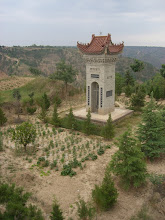| Today's first science club activity was a great success. I had forgotten what it is like to teach science. I taught chemistry in graduate school and then taught math, physics, and chemistry in Africa but had to use French in a pretty challenging classroom. Teaching a low level environmental simulation in English even to students who are learning English as a foreign language was wow... easy and super fascinating. During the first part of the simulation where students were not allowed to talk, they quickly emptied their pond of fish and no one was able to feed their family after two fishing seasons. It was interesting to see that when there were only two fish left in the pond, no one wanted to take them even though it meant that they would live and be able to keep playing. Another observation was that one group tried to fish all at the same time which created a competitive atmosphere where actually no one was able to use their straw to get any fish out of the bowl. During the second part of the simulation where students were allowed to talk and strategize, one group decided that everybody would only be allowed to take two fish which created a balanced sustainable fishing season that could go on for years. They were a very organized group and would take turns to fish instead of trying to fish all at one time. The other group didn't really strategize and realized too late that soon their pond would be empty. Eventually a student from the group with the empty pond moved to the sustainable pond. By adding an extra family to feed, the pond quickly ran out of fish. I found it fascinating that the group with the sustainable pond let the newcomer fish first, but once they all realized that the newcomer would create an imbalance where the pond would soon run out of fish, she no longer was allowed to fish first. The group that made rules about fishing and then had an extra mouth to feed was able to fish for 6 seasons. The other group only fished for 3. The students came up with the following strategies to protect resources for the future:
The students recommended the following to help protect our resources:
|
Friday, November 12, 2010
Fishing Simulation
Subscribe to:
Post Comments (Atom)

2 comments:
Neat to hear. I think my school in CO did that same sort of exercise. the guy who did it there added the complication of adding waste to the pond after the fish are eaten. If the waste out numbers the fish. no more fish. People have to decide to take waste out as well as fish.
really neat to hear their discussion though. and that would be a fun way to work with english. Neat.
Hooray! Forrest referred me to your blog—this was one of my favorite exercises as a teacher, the classic tragedy of the commons.
If you're feeling a lack of ideas for blog fodder, you should post your instructions so other teachers can follow your lead.
I used to do this exercise with colored marbles so I could make things more complex. I would use one color to represent the resource and another to represent waste, a byproduct of consuming the resource. If waste exceeded the resource, the resource stopped "growing."
I think sharing accurate and inaccurate information should be other colors/factors, having positive and negative effects on resource growth and use. That would be appropriate for our info age. ;-) But really, I'm just saying thank you for sharing!
Post a Comment